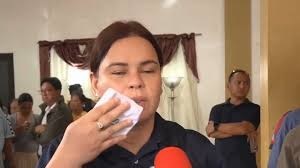A Renewed Debate on Public Transparency

In a move that reignited a long-standing debate over government transparency in the Philippines, Vice President Sara Duterte publicly questioned the recent decision by the Office of the Ombudsman to lift restrictions on accessing the Statements of Assets, Liabilities, and Net Worth (SALNs) of government officials. Speaking at a press conference in Manaoag, Pangasinan, on a Saturday, the Vice President expressed skepticism, suggesting the highly publicized reversal was merely a “show” engineered for an ulterior motive, rather than a genuine shift in policy.
Duterte’s central contention hinges on the idea that the right to access these crucial financial documents was never truly revoked in practice, even during the period of supposed restrictions. She characterized the Ombudsman’s new directive as an unnecessary public spectacle, casting doubt on the need for an official order to restore what she views as a pre-existing practice.
“I don’t understand why they would come up with this story that [the public] can finally get copies of SALNs,” Duterte stated, a recording of which was later provided to media outlets in Manila. “I don’t know why they have orders that would allow access to SALN, when SALNs can be obtained even before.”
The Claim of Prior Access
The Vice President firmly maintained that, in her experience, obtaining a SALN was always a matter of submitting a formal request to the Office of the Ombudsman. “You will just write to the Ombudsman and ask for the SALN of that person,” she explained, implying that the bureaucratic mechanism for access remained operational despite any official policy changes.
To bolster her argument, Duterte cited her own history with public disclosures, specifically recalling instances where journalists had successfully acquired her SALN years ago. She mentioned that reporters, particularly from the Philippine Center for Investigative Journalism (PCIJ), had accessed her financial statement in 2019, a year before the controversial restrictions were formally implemented. She further noted that other media outlets and figures, including former Senator Antonio Trillanes IV, had also previously gained access to her public records. This history, she argues, demonstrates a functional, albeit perhaps selective, system of public access that preceded the Ombudsman’s recent fanfare.
The Martires Era: The Genesis of Restrictions
To fully grasp the significance of the Vice President’s critique, one must look back at the origins of the restrictions. The public controversy surrounding SALN access began in earnest in 2020, when the then-Ombudsman, Samuel Martires—an appointee of the Vice President’s father, former President Rodrigo Duterte—issued a memorandum circular that significantly curtailed the release of the SALNs of government officials and employees.
Martires’s policy shift was met with immediate and widespread backlash from media groups, legal practitioners, and transparency advocates. For decades, the public’s ability to examine the SALNs of elected and appointed officials had been a critical tool for accountability, used to flag unexplained wealth or potential conflicts of interest. The restriction was seen as a major blow to anti-corruption efforts and the principle of public accountability.
In defending his controversial stance before the budget panel at the House of Representatives, Martires remained defiant, stating he would maintain the restrictive policy despite the criticism. He repeatedly denied requests from journalists and lawyers, basing his justification on his interpretation of Republic Act No. 6713, otherwise known as the Code of Conduct and Ethical Standards for Public Officials and Employees.
A Contradictory Interpretation of Law
Martires insisted that the law disallowed journalists from commenting on the contents of the SALNs, a narrow and contentious reading of the statute. However, critics were quick to point out the glaring contradiction: the very same law he cited explicitly affirms that “the public has the right to know” the SALNs of all government officials and employees. This legal provision underpins the core philosophy of transparency in a democratic government, positioning the SALN as a public document essential for monitoring the integrity of public servants.
The previous administration’s restriction effectively created an environment where the default setting for public documents became secrecy, a stark departure from the spirit of the law and international standards of government openness. This context is crucial because it provides the backdrop against which the current Ombudsman, Jesus Crispin Remulla, issued the new order, which ostensibly returns the policy to its former, more accessible state.
The Allegation of Political Motive

For Vice President Duterte, the timing and high-profile nature of Ombudsman Remulla’s order—which undoes the policy of his predecessor, a close ally of her father—suggests a calculated political strategy. She strongly believes the announcement was not a procedural necessity but a deliberate “show” meant to create a misleading narrative of newfound transparency.
Duterte’s skepticism centers on the idea that the order is being used to score political points or, more ominously, that it is “for a motive.” In political discourse, such a statement often implies that the reversal is intended to facilitate an investigation or scrutiny of certain political rivals, possibly including figures associated with the previous administration, like herself or her family.
“I don’t understand why they would come up with this story that [the public] can finally get copies of SALNs. And I am sure it was for a reason, it has a motive,” she reiterated, suggesting that the public relations aspect of the policy change overshadows its actual impact on public access.
Implications for Governance and Accountability
The exchange between the Vice President and the Office of the Ombudsman highlights the precarious and often politicized nature of transparency mechanisms in the Philippines. While transparency advocates would welcome any official move to restore full public access to SALNs, Duterte’s commentary forces a deeper examination: Was the barrier to access purely an official policy, or was it the result of administrative discretion that could be easily circumvented?
If, as Duterte claims, access was still possible through direct requests, the core issue may not have been the written rule but the selective enforcement and arbitrary nature of the previous administration’s restriction. Conversely, if the recent order truly simplifies the process and eliminates the need for journalists and citizens to overcome bureaucratic hurdles, it represents a genuine, positive step forward for accountability.
Ultimately, the Vice President’s challenge—that the order is a mere political spectacle—shifts the focus from the act of lifting the restriction to the integrity and purpose behind the reversal. It pushes the public and the media to look beyond the headline and scrutinize whether the new policy leads to a truly open, efficient, and non-selective process for obtaining the financial records of public servants. The success of the Ombudsman’s new directive will be measured not by the fanfare of its announcement, but by how easily and consistently citizens and watchdogs can hold their government officials accountable moving forward.





